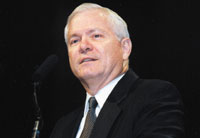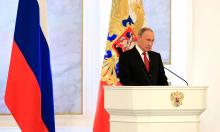Robert Gates dubbed anti-Rumsfeld spy chief
After heading the U.S. Defense Department for less than three months, Robert Gates is showing an instinct for decisiveness without the reflex for defensiveness that was a hallmark of his sometimes prickly predecessor, Donald H. Rumsfeld.

In both style and substance, Gates is being called the "anti-Rumsfeld."
Gates has not been confronted with the kind of tough decisions that faced Rumsfeld in the aftermath of the Sept. 11, 2001, terror attacks. Neither is he attempting to press as broad an agenda as did Rumsfeld, who took over as defense secretary in January 2001 with a mandate from President George W. Bush to transform the U.S. military.
Yet in ways large and small Gates is displaying more pragmatism in managing the Pentagon, even as he faces the mammoth task of overseeing wars in Iraq and Afghanistan. He has taken a less confrontational approach to the news media and has improved relations with Congress. And in some cases he has publicly criticized what happened on Rumsfeld's watch.
That has been spotlighted by the outrage generated by news reports of shoddy living conditions and excessive red tape for war-wounded soldiers at Walter Reed Army Medical Center, the Army's showcase medical facility in Washington. So far, Gates has shown an inclination to act aggressively when he saw Army leaders trying to minimize the seriousness of the scandal.
At his urging, Army Secretary Francis J. Harvey fired the two-star general who was in charge of Walter Reed. And the next day, Gates forced Harvey to resign because he was dissatisfied that Harvey had put another general temporarily in charge at Walter Reed who also was under scrutiny for his role there.
"I don't have very much patience for people that don't step up to the plate in terms of addressing problems that are under their responsibility," Gates said shortly before Harvey's departure was announced.
Last week, Gates told a congressional panel that he found it ridiculous that when he took office in December the Pentagon was planning to spend about $100 million (EUR 76.4 million) to build a courthouse complex at the U.S. naval base at Guantanamo Bay, Cuba, to hold military trials for some of the hundreds of suspected terrorists held there. Gates dumped that construction plan and substituted a more modest proposal to facilitate the trials.
Democratic Sen. Bill Nelson said in January that after six years of Rumsfeld rule, Gates was a "breath of fresh air."
Gates also has made deliberate gestures to repair relations with the military, which at times saw Rumsfeld's combative style as dismissive, even disrespectful. Gates has made a point of meeting once a week with the service chiefs on their turf, the secure conference room in the Pentagon known as "the Tank."
Comparisons were inevitable, and it may be early to reach firm conclusions about the Gates tenure. That he has shown morewillingnessto listen to others - his generals, his staff and members of Congress - may be explained at least in part by his newness at the Pentagon that give him a lot to learn.
On the other hand, some who watched Rumsfeld and Gates see signs of important differences.
"I don't find it a coincidence that just as Gates has come into the senior echelons of the Bush administration's policy-making process that it is showing more flexibility with respect to Iran," said P.J. Crowley, a former Defense Department and White House official during President Bill Clinton's administration and now a senior fellow at the Center for American Progress, a liberal think tank. He was referring to the administration's decision announced last week to join diplomatic talks with Iran over the future of neighboring Iraq.
Gates says he is amused at the interest in comparing him with Rumsfeld. He says he is not consciously trying to underline differences, but he did so in his first public speech overseas. Without mentioning Rumsfeld by name, he referred to comments the former secretary made in the run-up to the Iraq war, when he criticized traditional allies like France and Germany that opposed invading Iraq, referring to them as "Old Europe."
Gates told an international audience in Munich that some people have tried to divide the allied countries into categories: east and west, north versus south.
"I'm even told that some have even spoken in terms of `old' Europe versus "new,"' said Gates, who was CIA director in the administration of President George H.W. Bush, the current president's father. "All of these characterizations belong in the past."
Daniel Goure, a defense analyst at the Lexington Institute think tank, said Gates may be enjoying a sort of honeymoon with the public and with Congress, which over time grew to see Rumsfeld as arrogant and overly defensive, the AP said.
"Rumsfeld let everybody know that he was the smartest man, not (just) in the room but in the whole building," Goure said. "That is not Gates. That is the first thing. Secondly, Gates is not enamored with the camera."
Rumsfeld emerged as a star of Bush's Cabinet with his brashly confident post-Sept. 11 televised news conferences on the invasion of Afghanistan and later the war in Iraq. As the war wore on and became deeply unpopular, however, his feistiness came to be seen in a less favorable light. Gates evidently saw that confrontational style as something he should avoid, and he has.
Gates has taken to holding news conferences in what he considers a more relaxed setting, seated behind a large desk in the Pentagon briefing room rather than standing behind a rostrum targeted by multiple cameras.
"I feel more at ease in a more informal setting," he said recently. "Frankly, I get tired when I stand up too long."
Subscribe to Pravda.Ru Telegram channel, Facebook, RSS!





